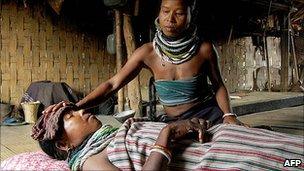Germany halts Aids fund payment over corruption claims
- Published

Germany has suspended its annual payment of more than 200m euros (£172m) to the Global Fund against Aids, TB and malaria, following corruption claims.
Germany is the third-biggest donor to the UN-backed fund, which has an annual budget of more than $20bn (£12bn).
Media reports speculate that billions of dollars may have been siphoned off.
But the Fund said the sums concerned were far smaller and it had "one of the most intensive investigation regimes of any international organisation".
It says the misuse was discovered by its own investigative unit. It says $34m of misappropriated or unsubstantiated funds have been demanded back as a result.
A spokesman told the BBC some of the original reporting on the story had been "sloppy" and was based on information which the Fund had not tried to keep secret but had voluntarily released over the past 15 months.
The Global Fund is the biggest single source of money to tackle the three big killer diseases.
The allegations of corruption were raised in reports by The Associated Press (AP) news agency.
'Serious allegations'
German Development Minister Dirk Niebel said the claims required a thorough investigation.
"I take the allegations of corruption and breach of trust carried by media against the Global Fund very seriously, and I expect that the fund will promptly clear them up," he said.
"I have halted all further payments to the fund until it is fully cleared up."
Jon Liden, a spokesman for the Global Fund, confirmed to the BBC that the misuse of some $34m of funds had been uncovered in nine countries by the Fund's own inspector general, following investigations in 33 of the 145 countries the Fund is active in.
He said the most grievous instances of fraud had been found in Mali, Mauritania, Djibouti and Zambia - but said in three of those cases it was the Fund's own regular audits which picked up the irregularities, and that they had been made public over previous months by the Fund itself.
He acknowledged that there "are probably more instances of misuse to be uncovered", but said media reports suggesting the sums concerned could amount to billions were likely to be wildly inaccurate.
Mr Liden said he did not "blame [Minister Niebel] for being nervous. He has said he wants a full review of our procedures to reassure himself. We are more than welcoming that - we are very confident that our procedures will stand up to scrutiny".
'Unfair treatment'
He said corruption was a "necessary risk" the Fund had to take when disbursing funds in countries racked by poverty and war, and claimed the Fund had saved more than seven million lives.
The Fund felt "unfairly treated by the media", Mr Liden said, "but so far the donors are not punishing us".
A spokesman for the German development ministry, Sebastien Lesch, told the BBC that he understood Fund representative Christoph Benn would be visiting the ministry on Monday to explain the situation.
Mr Lesch defended the German decision to suspend the funds, saying the move aimed to safeguard the interests of German taxpayers and denying the ministry had acted hastily.
He said he expected the Fund to clear up the matter, but also pointed out that using a multilateral agency such as the Fund was not the only way to disburse aid.
"This type of fund which gives the disbursement responsibility to partner governments is very open to corruption," Mr Lesch said.
"There are other instruments which are more suited to dealing with the money in the correct way - for example, bilateral programmes. There are different ways.
"The Fund is susceptible to corruption and the minister has always made clear [it] is a very good instrument to fight disease but it is not the only instrument."
- Published16 June 2010